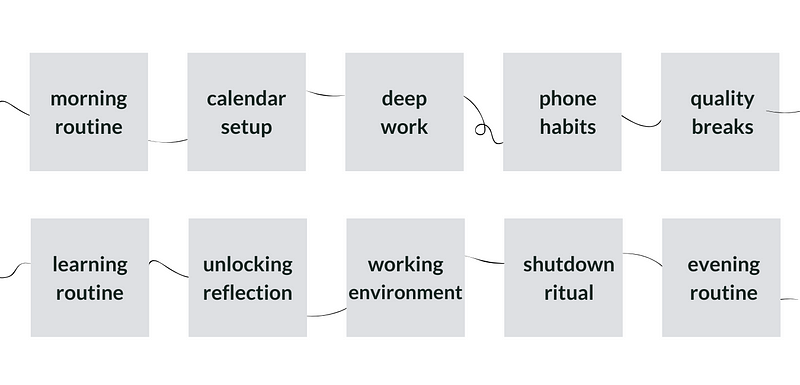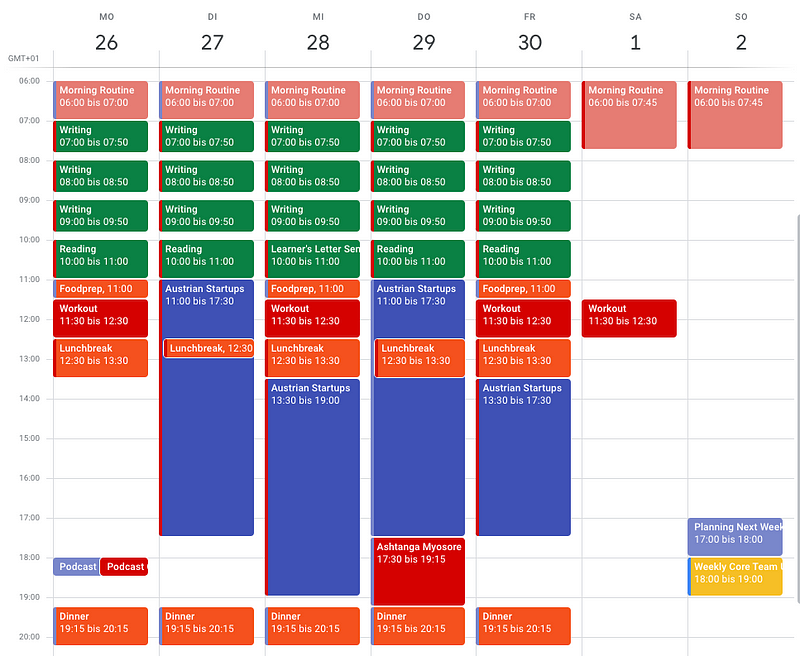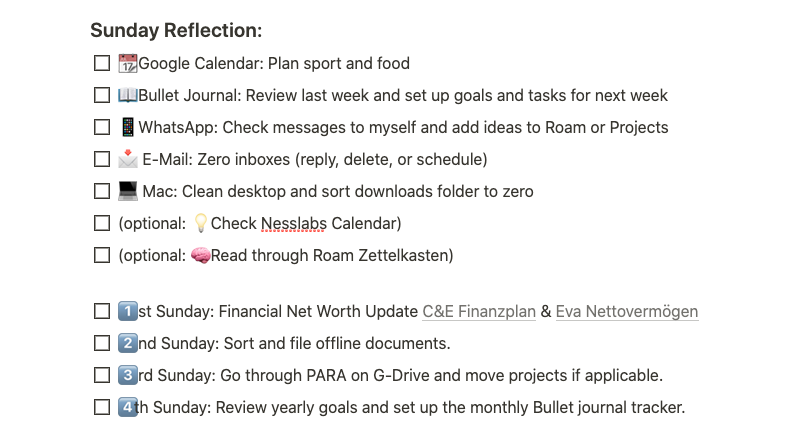Make your time work for you.

When I started working for myself a year ago, I felt bombarded with suggestions on structuring my days. I was overwhelmed by conflicting advice and struggled to find a balance between hustle and rest.
This is the article I wish I’d had when starting to work for myself. I skipped the self-help fluff and distilled what made my days such a massive force for achievement and joy.
The following structure helped me earn a consistent +$5K monthly income, generated through writing, podcasting, and consulting.
You may not like all of these suggestions, or you might have great routines for some areas. If so, skip the paragraph. Your life, your rules. This article has only a single purpose: helping you, dear creator or solopreneur, getting smart at building your thing and excelling at whatever you’re doing.

A morning routine to set you up for success
Many people talk themselves down when they don’t check all of their morning routine boxes. I was the same. Unless I did oil-pulling, drank a glass of warm water, took a cold shower, meditated for at least 15 minutes, journaled about my dreams, visualized my goals, and practiced 20 minutes of yoga, I felt like a failure.
When a routine feels like an obligation, it misses the point. There’s not the perfect routine. Your morning routine is less about what you do than why you do it. Design a routine around your goals.
But this doesn’t mean you need to follow the same pattern every day. If you get up and feel like going for a walk, do it. If you don’t feel like journaling, skip it.
The best results often come from a combination of structures and intuition. Adjust your routine to your needs, and wants and don’t judge yourself on checking the boxes.
Probing questions to ask yourself:
- What’s the first thing you do in the morning?
- Which activities help you get excited for the day?
- Are there any habits you can do to feel fresh and awake before you open your laptop?
A calendar setup that will make you thrive
If you ever feel like you have too many things to do and not enough time to do them, it’s likely because your calendar isn’t set up for success.
As a creator, time is your most valuable resource. To make the most of it, learn to master a respectful no and use time blocking.
Time blocking is a simple productivity trick people like Elon Musk use. While a to-do list shows you what you need to do, time blocking reveals when you’re going to do it.
The technique works because it’s designed for focus. When you work towards one goal at a time, you are more productive than splitting your attention across various projects.
Plus, when you know you have time set aside later for checking messages, you’re less likely to give in to hooking mechanisms and random e-mail checks.

My high-level priorities include writing, reading, eating good food, moving my body, and client work. These time blockers are non-negotiable. Even in a work-intense week, I won’t skip the sports and food blocks because that’s how I keep my balance.
When you see in your calendar the time that’s blocked for existing projects and your thinking time, you’re less likely to say yes to other people. You take ownership of your time. Y
“In this day and age you cannot call something distracting unless you know what it’s distracting you from.”
— Nir Eyal
Probing questions to ask yourself:
- What’s the proportion of calendar events you created vs. events other people invited you to?
- Which meetings can be replaced by a call, an email, or a shared document?
- How can you integrate time-blocking to focus on your high-level priorities?
Deep work is your most valuable skill
If you can create three focused hours of uninterrupted creation time, you solve most of your time management issues. Because once you’re in deep work and focus on one thing for an extended period, you produce your best work.
Cal Newport says Deep Work is “professional activities performed in a state of distraction-free concentration that push your cognitive capabilities to their limit.”
From an 8-hour workday, how much do you really work? Your best work does not emerge from the total time spent but from the intensity of focus. Here’s the equation:
High-Quality Work Produced = (Time Spent) x (Intensity of Focus)
To get into deep work, choose a space free of distractions. Then, determine how much time you’ll devote to the task ahead. For a start, aim for 10–15 minutes. After a few days of deep work, your ability to focus on one task will increase.
Probing questions to ask yourself:
- How much time do you do deep work during a day?
- Do you protect your deep work sessions with time blocks in your calendar?
- What’s your deep work structure? (Will your phone be off or on? Will you let yourself check the internet? How will you measure a session’s success (pages read, lines coded, words written)?
Cultivating helpful phone habits
If you’re like 80% of smartphone users, you check your device every morning within the first 15 minutes after waking up.
By checking your phone early in the day, you condition your mind for distraction. Notifications and messages will make your thoughts bounce around like a ping-pong ball.
Throughout your day, your morning behavior repeats itself. By checking your phone too early in the day, you won’t produce any deep work. You’ll get distracted and lose focus again and again.
According to this study from Irvine University of California, it takes 20 minutes to refocus after distractions.
As a self-employed creator, you have the ultimate freedom over your days. No boss can schedule an unproductive meeting at 9 AM. Protect your time by cultivating smart phone habits (pun intended).
My phone is in flight mode from 8 PM to 12 PM. I’ve been using this schedule for half a year, and it’s the single most effective productivity and health booster. It helps me focus on my tasks and makes my mind calm down.
Probing questions to ask yourself:
- Do you control your phone, or does your phone control you?
- Do you charge your phone at a place you don’t see it?
- During which hours do you want to be available for calls and other people’s requests?
Quality breaks you need to take every day
Did you ever finish your workday realizing you haven’t moved away from your chair for the past 4 hours? In our work culture, many people see breaks as a luxury. But to find long-term joy in your workdays, you need them.
Luckily breaks don’t need to be complicated. A study compared break lengths of 1, 5, and 9 minutes, and even the shortest break made workers feel better.
To take regular breaks, I use Be Focused. The timer starts in 50-minute intervals for my writing sessions and reminds me to take a 10-minute break. When it rings, I stop whatever I’m doing and move away from my screen.
This is how what I typically do during my breaks: Drink a cup of water. Make a tea. Practice the guitar for a few minutes. Dance and shake to a song. Take a short walk outside. Puzzle. Prepare lunch or dinner. Sit down to meditate. Clean the bathroom. Stretch. Take a long walk outside and call a friend.
The list is endless. Your breaks might look completely different. But take them. Scheduling meaningful breaks inside your days will help you enjoy your workdays and prevent you from overworking.
Probing questions to ask yourself:
- How often do you take breaks during a working day?
- Have you scheduled breaks in your calendar?
- Do you have non-negotiable playtime for undirected exploration?
Focus on learning and knowledge expansion
Knowledge is power. That’s why learning can improve any life. Yet, only very few people make learning an ongoing habit.
No life skill can earn you greater dividends than learning how to learn. We can’t expand our time, but we can expand our minds. Learning is the virtuous circle that can help you create the life of your dreams.
Reading is the easiest way to learn every day. Books are to the mind what exercise is to your body. They make you discover truths about the world and yourself. Page by page, they help you live a happier life.
Reading is liberating. Freedom means choosing from a set of options. The more options you have, the freer you are. But most people don’t know about all their options. And that’s where reading kicks in. It helps you explore options you never knew existed.
So, read outside of your specific field. Say less and ask more and better questions. Let curiosity guide you to learn something new.
I reserve time to read books, newsletters, listen to podcasts, take online courses, join learning communities, attend educational conferences, and take notes after exciting conversations.
“The most important skill for getting rich is becoming a perpetual learner. You have to know how to learn anything you want to learn.”
— Naval Ravikant
Probing questions to ask yourself:
- Which three skills do you want to learn this year?
- What’s the ratio between spending time on social media vs. learning something helpful?
- Does your calendar reflect your learning goals? Do your learning activities align with your goals? If not, how can you adapt?
Unlock the power of reflection
“Most people are other people,” Oscar Wilde once said. “Their thoughts are someone else’s opinions, their lives a mimicry, their passions a quotation.”
Whenever I have a spare moment, I try to fill it. I listen to podcasts, read books, have a conversation with my beautiful boyfriend, answer messages, or hop to the next task in my bullet journal.
And while these activities can be enjoyable and add energy to my life, they have a marginal return on thinking utility. After a certain point, every additional minute of doing decreases the ability to think for yourself.
When we’re so busy doing, we don’t spend single second thinking. Entire days go by without a single deep thought. At the end of your life, you realize you’ve lived the life of others.
“We do not learn from experience. We learn from reflecting on experience.”
Before learning from Warren Buffett, Bill Gates said he had every minute packed and thought that was the only way you could do things. Bill concludes Warren taught him the importance of giving himself time to think and reflect.
Reflection is the active decision to think about your past. Researchers define reflection as the intentional attempt to synthesize, abstract, and articulate the key lessons taught by experience.
I integrate reflection every Sunday. They are the most valuable 60–90 minutes I spend every week. Here’s how my Sunday reflection checklist looks like:

Probing questions to ask yourself:
- Do you have a daily, weekly, and yearly review in place?
- Do you block time to think about what you achieved instead of moving forward?
- Do you have a habit of asking yourself after each completed job “what went well” and “even better if”?
Design your environment for desired behavior
I long believed that I need motivation and willpower to adopt new habits. But both resources are limited. When I first read the following section by James Clear, I realized I overlooked one of the most critical factors in building desired behavior:
“Our behavior is not defined by the object in an environment but by our relationship to them. In fact, this is a useful way to think about the influence of the environment on your behavior. Stop thinking about your environment as filled with objects. Start thinking about it as filled with relationships. Think in terms of how you interact with the spaces around you. For one person, her couch is the place where she reads for an hour each night. For someone else, the couches where he watches television and eats a bowl of ice cream after work.”
When you design the right environment for your desired habit, you link the habitat to the desired habit. That’s why it makes sense to design an environment around the person you want to become.
If you want to write every day, your environment’s essential elements are a computer, site blockers, noise cancellation headphones, and a distraction-free place to write. That way, you turn into the architect of your reality.
“If we do not create and control our environment, our environment creates and controls us.”
— Marshall Goldsmith
Probing questions to ask yourself:
- Is your physical workspace supporting you? (screen at eye level, daylight, a healthy seating position).
- Is your digital workspace setting you up for success? (which apps are installed, do you use site-blockers, tools to manage your knowledge)
- Do you keep your phone and distractions away during your deep work session?
End-of-day shutdown rituals
If you work in an office or co-working space, you can skip this. Your natural shutdown ritual is leaving the building and heading home.
If you, however, are among the 50% of people in the US who work from home, a shutdown ritual is crucial for your mental health.
After a full day, it’s challenging to calm down and get ready for the evening. In the early days of my self-employment, I found myself working until late. Sometimes I replied to mail or watched online courses when I knew I should be calming down.
This works if you do it once in a while. But after a few days working long evenings, you have to search for the energy and enthusiasm to create great content. A shutdown ritual will improve your remote work productivity.
“A shutdown ritual is a set routine of actions that you perform at the end of each work day to finalize your day and signify that your work day is done.”
— Cal Newport
A great shutdown routine ensures that you review incomplete tasks, goals, or projects and you confirm that you have a plan you trust for its completion, or you wrote it down somewhere you’ll see it at the right time.
Your end-of-work-day ritual can have different elements: updating all to-do lists, review the calendar for tomorrow, writing a plan for the next day, closing every tab on your computer, leaving your working desk.
Before dinner, I take 5–10 minutes to go through my Bullet Journal and review the daily log. I tick off To Do’s, move them to the next day, and add items with a look on my weekly goals and my calendar. I close all computer windows and leave my desk.
Consciously ending your workday gives you a beautiful feeling that everything you needed to do is done or schedule.
Probing questions to ask yourself:
- Do you wrap up your day and plan for the next one?
- How do you know your workday is over?
- What reminds you to start your shutdown ritual? (time, feeling, alarm)
Evening routine
According to the National Sleep Foundation, 45% of Americans state poor or insufficient sleep affected their days at least once in the past seven days.
But even if you’re among the lucky ones who fall asleep quickly, a proper evening routine can improve your focus, well-being, and health.
As with the morning routine, there’s not the perfect evening routine. Do whatever feels good for you.
My evenings vary, but most include some of the following activities: having a friend over for dinner, foam roll, guitar practice, calling a friend, cooking, talk to my fiancé, or go for a walk. The only constant thing is that I put my phone into flight mode and go to bed around 9 PM.
Probing questions to ask yourself:
- What helps you sleep better and relax?
- Which activities do you enjoy in the evening?
- What’s the last thing you want to do before sleeping?